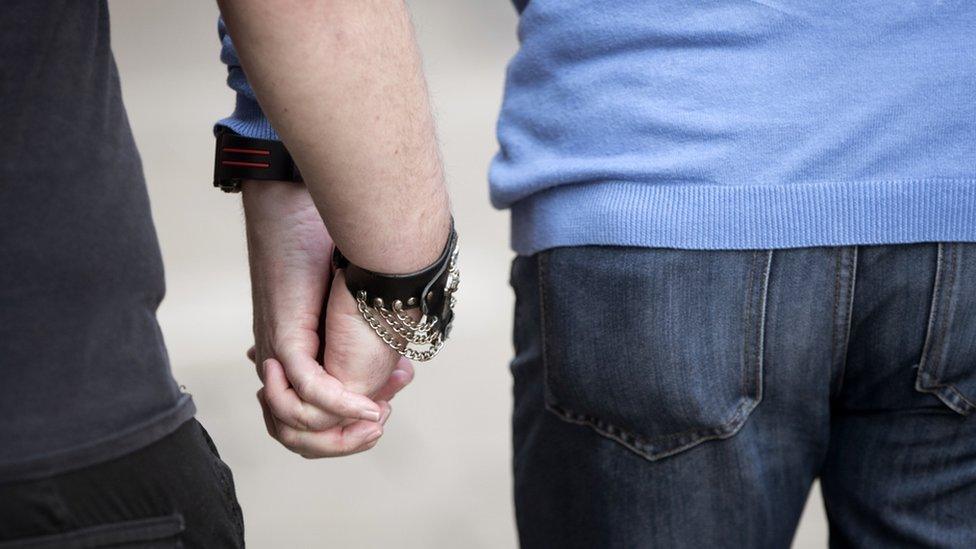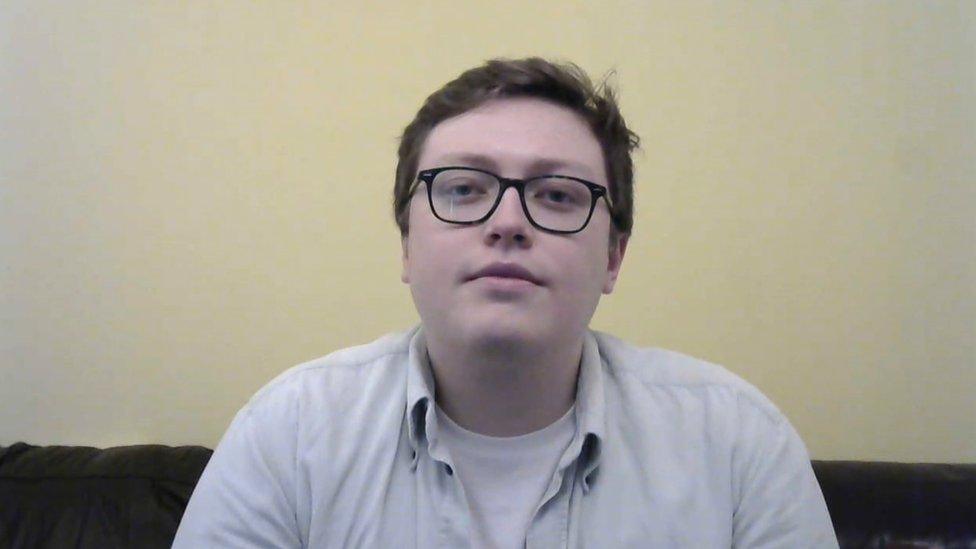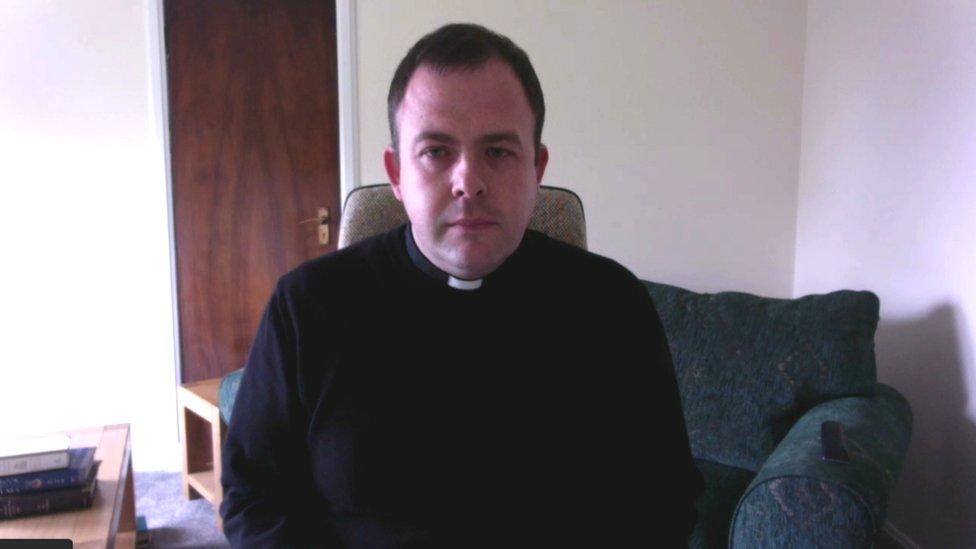'Conversion therapy left me emotionally traumatised'
- Published
Justin says the conversion therapy process left him "completely emotionally traumatised"
Growing up in the west of Scotland, Justin Beck's life revolved around church.
When he was 13 he realised he was attracted to boys and looked to the Bible for guidance.
He found the passage "a man shall not lie with a man the way he lies with a woman".
He said this made him feel like homosexuality was a "sin" and set him on a path towards conversion therapy involving "exorcisms" to remove "demons" he believed were inside him.
It was a process which left him "completely emotionally traumatised".
He has been speaking to BBC Scotland to highlight a campaign for a law banning conversion therapy in Scotland.
The End Conversion Therapy Campaign is seeking the backing of all sitting MSPs and candidates in May's Scottish Parliament elections and has cross-party support.
The term "conversion therapy" refers to any form of treatment or psychotherapy which aims to change a person's sexual orientation or to suppress a person's gender identity.
A 2018 survey of 108,000 UK members of the LGBT community suggested 2% have undergone the practice, with another 5% having been offered it.
Many global faiths, including Christianity, Islam and Judaism have traditionally taught that any sex outside of heterosexual marriage is wrong.
'Demons cast out of me'
Justin, who is now 36, said he initially thought baptism would change his sexuality.
He was, in his words, "dooked under the water and brought back up again". He hoped he would emerge straight.
He changed church at 17 and started six years of conversion therapy between 2001 and 2007.
He is very clear that this was his choice. But said he was "in a very vulnerable position".
He said no-one in his life ever told him "you're gay and that's ok".
"Every Sunday I would be down the front of the church. People would be laying hands on me, speaking in tongues. And then that would ramp up to things like exorcisms, having demons cast out of me," he said.
He said he felt he had to give a reaction, so would fall to the floor and start to shake.
"Eventually I would just sit up and look at the boy that I fancied in the church and think 'nope, still fancy him'," he said.
"When I look back at that period of my life the overwhelming emotion that I can remember is loneliness."

In December last year more than 370 religious leaders from around the world called for a ban on conversion therapy.
Prime Minister Boris Johnson has previously said that conversion therapy "has no place in this country" and the UK government has said it will outline plans for a ban after research into its prevalence is completed.
The campaigners in Scotland want the Scottish government to act sooner and go further.
They believe ministers at Holyrood have the power to introduce legislation on public health grounds.
They also want the "suppression" of someone's sexual identity outlawed and believe this would include any groups providing support or encouragement to someone trying to not act on their attractions.
Blair Anderson, from the End Conversion Therapy Campaign, said: "No one is born hating themselves.
"If someone is volunteering it's often not of their own accord. It's because they're surrounded by people …who are pressuring them or manipulating them."

Campaigners like Blair also want the suppression of someone's sexual identity banned
He said conversation therapy stemmed from a belief there was something "broken" and needing fixed with an LGBT person.
The campaign believes that is "incompatible with a modern, free, democratic society".
If the campaigners get the law they are seeking it could potentially affect religious groups.
One example is a Catholic Church group called Courage International, which has four chapters in Scotland.
The organisation offers "pastoral support" to people who are attracted to the same sex but want to "strive for chastity" (avoid all sex).

Father Martin Delaney says the Catholic Church has no interest in changing anyone's sexual orientation
Father Martin Delaney is Chaplain for their branch in the Diocese of Motherwell and described it as a "support group" set up at the request of committed Catholics who are trying to "live according to the church's teaching".
He said Courage International does not tell people how to live, but offers "support and friendship" to those who have already made the decision not to act on same-sex attractions .
He said: "The Catholic church in Scotland doesn't practice or promote or condone coercive or harmful therapies and has no absolutely no interest in trying to change anyone's sexual orientation."
Asked how he felt about the End Conversion Therapy Campaign wanting the actions of a group like Courage covered by new legislation, he said: "Courage is only helping people to live out the teaching of the Catholic Church.
"The problem is where it seems to be the potential criminalisation of people's beliefs and people's free choices in accordance with their religious convictions."
He said that if politicians want to change the law and "try to criminalise elements of people's beliefs" then they have "a duty to make this very clear" before May's election.
'No place in Scotland'
The Scottish government said that it "fully supports moves by the UK government to end conversion therapy and does not support or advocate the practice of conversion therapy in the UK".
A spokesman added: "We regard it as unethical, harmful, and as having no place in Scotland."
The debate is likely to continue around the definition of "conversion therapy" and what constitutes "suppression" of someone's sexual identity.
Having been through attempts to change his sexuality, Justin has a warning for others who are told their attractions can be changed.
"It doesn't work," he said.
"So save yourself years of emotional trauma and therapy and counselling afterwards."